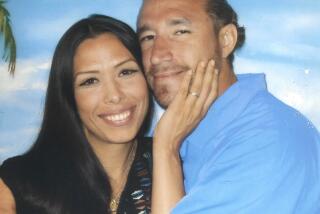Police say she helped her husband, who is accused in a grisly torture plot. How did she become a lawyer?

Recently recaptured Orange County prison escapee Hossein Nayeri appears in court in Santa Ana, Calif., on Tuesday. His ex-wife, Cortney Shegerian, who is an employment rights lawyer, may have had a role in some alleged crimes, police say.
Cortney Shegerian was a law student when, police say, she helped her husband conduct surveillance on a man who was later abducted and mutilated. Two years later, she was licensed as a California lawyer.
Her role in her ex-husband’s alleged crimes, described by a Newport Beach police detective in court testimony, has raised questions about the admissions process of the State Bar of California. All applicants for a law license must pass a moral character review.
State bar officials refused to discuss Shegerian’s application, citing confidentiality rules, and it is unclear whether the bar knew about the role the detective said she played in her husband’s alleged crimes. She told authorities that she poisoned hamburger meat, at her husband’s behest, assuming it would be fed to a dog, the detective said.
But lawyers who practice before the bar, former bar officials and a legal ethicist said it is possible for someone to obtain a law license even after committing the kinds of actions investigators have attributed to Shegerian. She now works as an employment rights lawyer in Santa Monica.
“The proximity of the time of criminal conduct to the time of application for admission is a factor against admission but it is just one factor and may be outweighed by others,” said Stephen Gillers, a legal ethics expert.
California and most other states permit even convicted felons to apply for law licenses. Shegerian, who agreed to help prosecutors catch her ex-husband, was never charged as an accomplice.
Gillers said bar officials would have examined the amount of time between the activity and the application, whether it involved dishonesty, whether there was other criminal history, the age of the applicant at the time and whether the applicant was candid about the lapses.
“Here, one would also ask whether she was intimidated by or subject to the control of her husband,” Gillers said.
Shegerian’s ex-husband, Hossein Nayeri, 37, faces charges stemming from a grisly 2012 kidnapping and torture plot. Shegerian, who was a student at Whittier Law School at the time, later cooperated with investigators and helped them arrest Nayeri after he fled the country.
Shegerian graduated from Whittier Law in May 2013, about the same time she started cooperating seriously with the police. She was admitted to the bar in May 2014. Nayeri was captured in November 2013.
The couple met when Shegerian was a teenager and eventually settled in Irvine. Seven months after the wedding, Shegerian filed a domestic violence restraining order against Nayeri. She claimed he had pinned her to the floor with his foot on her chest, and put her in a chokehold. She also said he threatened to kill her with a box cutter and that she suffered from post-traumatic stress disorder.
Patrick Dixon, who served eight years on a bar committee that examines problematic candidates for admission, said her case likely would have been subjected to such a review if bar officials knew her alleged history. He said he did not recall the case and does not believe he was ever involved in deciding her admission.
The fact that she helped police and may have been abused by her former husband would have been considered mitigation, he said. Being candid about her history also would have helped her, he said.
But she still would have had to prove she had been rehabilitated, he said. Donating time to a charity is one way to show rehabilitation.
“She may have told the bar examiners about this, and they may have given her a pass,” said Dixon, a former Los Angeles prosecutor.
Prosecutors said Nayeri and two other attackers abducted a pot-dispensary owner from a Newport Beach home, drove him to the desert, tortured him with a butane torch, shocked him with a Taser and cut off his penis.
As police closed in on Nayeri, he flew to Iran, where he had family roots. Facing the possibility of criminal charges, Shegerian agreed to cooperate in an elaborate scheme to lure him to the extradition-friendly Czech Republic, where he was caught in November 2013.
“Something like this usually is disclosed,” said Robert Hawley, who recently retired as the bar’s deputy executive director, and who had no role in the case. “I think people would say that’s serious enough to disclose it and explain it.”
The Orange County District Attorney’s office, which is prosecuting Nayeri, would not comment on whether it referred its information about Shegerian to the bar.
“Had they forwarded that information, I’m sure that’s something they would have questioned her about,” said Susan Margolis, an attorney who specializes in attorney-discipline and bar cases, who has no connection to the case.
“They let her in, so whatever concerns they had might have been counterbalanced” by the knowledge that she had helped law enforcement with the criminal case. But, she added, “We don’t know.”
When applying for a law license, applicants are required to reveal crimes for which they have been convicted, as well as any pending criminal charges, or immunity deals granted in lieu of criminal charges, Margolis said.
It is not clear what kind of arrangement Shegerian may have struck with prosecutors in exchange for her cooperation in the case. She is expected to be a leading witness against Nayeri.
“You’re supposed to fill out the application as completely and honestly and thoroughly as possible, so if you omit material information on the application, that’s bad,” Margolis said. “If you don’t disclose something you’re suppose to disclose and they find out, that in itself can be grounds for not admitting you.”
Shegerian works for Shegerian & Associates, a firm founded by her uncle, Carney Shegerian. (The firm recently represented former sports columnist T.J. Simers in an age- and disability-discrimination suit against The Times, winning more than $7 million in damages. A judge later overturned the verdict, and the case is on appeal.) Cortney Shegerian has declined to be interviewed.
Gayle Murphy, who has run the bar’s admission office for about 10 years, refused to discuss Shegerian’s admission.
Speaking generally, Murphy said applicants’ fingerprints are processed, and the bar reviews DMV records and confidential questionnaires mailed to applicants’ references, employers, law schools and others.
Applicants, who can file for the review while in law school, also must fill out lengthy questionnaires that ask for disclosure of any actions that reflect their moral character.
Most applications are handled by staff, Murphy said. If someone has a spotless record, the process takes four months.
More complicated cases can take up a year to review and are referred to the committee of bar examiners, which interviews the applicant and decides his or her fitness to process law. That process can take an additional six months, Murphy said.
Join the conversation on Facebook >>
If the bar does not learn of alleged immoral conduct until after an applicant has been licensed, another investigation may be started, and efforts may be taken to disbar the lawyer, Murphy said.
An attorney for Shegerian said she risked her life to help police capture Nayeri. The lawyer said Shegerian did not know her husband was allegedly planning a kidnap, and that any role she may have played was inadvertent.
Margolis said that California is among the toughest states in disciplining lawyers for violating moral standards.
“We’re dealing in situations where even clients with one DUI in their background are being held up” from admission to the bar, she said.
Dixon said he would have wanted to know whether Shegerian acted under duress.
Dolan reported from San Francisco, Goffard from Los Angeles.
Maura.dolan@latimes.com | Twitter: @MauraDolan
Christopher.goffard@latimes.com | Twitter: @LATChrisGoffard
MORE ON THE O.C. JAILBREAK
O.C. escapees held a prisoner while on the run -- and fought over whether to kill him
Orange County jailbreak was an ‘embarrassment,’ sheriff says
More to Read
Sign up for Essential California
The most important California stories and recommendations in your inbox every morning.
You may occasionally receive promotional content from the Los Angeles Times.












